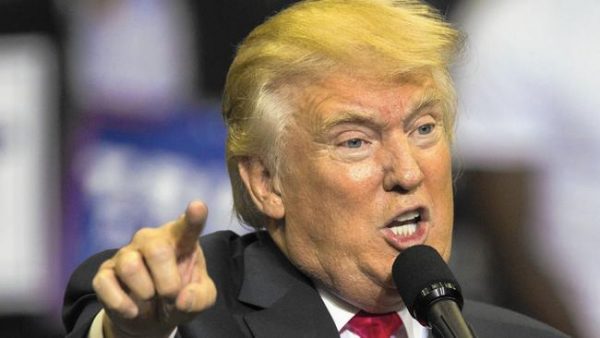 Donald Trump’s pledge to “Make America Great Again” was itself built on a host of lofty promises that galvanized his supporters and helped him clinch a stunning victory.
Donald Trump’s pledge to “Make America Great Again” was itself built on a host of lofty promises that galvanized his supporters and helped him clinch a stunning victory.
Below are some of Trump’s signature proposals supporters expect him to deliver on when he takes office in January.
The wall
Without question, Trump’s central campaign plank was his pledge to build a wall on the US-Mexico border. Trump made immigration a top focal point from the moment he launched his White House bid in June of 2015, when he controversially claimed that Mexico was sending “rapists” and “criminals” across the border.
The wall, which Trump has promised will be “beautiful,” was the centerpiece of his immigration policy. He insisted that Mexico would pay for its construction, although he didn’t broach the subject when he met with Mexican President Enrique Peña Nieto in August.
Many Democratic and more moderate voters have voiced opposition to the wall, but the proposal is wildly popular among Trump’s backers. Seventy-nine percent of his supporters said they favor building a wall along the entire US-Mexico border, according to the Pew Research Center.
‘Lock her up’
The chants began during the Republican National Convention. Soon, “lock her up” became a ritual at each of Trump’s rallies. And at the second presidential debate, Trump told Hillary Clinton that, were he to win, he would “instruct my attorney general to get a special prosecutor to look into your (missing email) situation.”
Clinton responded by saying it’s “just awfully good that someone with the temperament of Donald Trump is not in charge of the law in our country.”
Trump shot back: “Because you’d be in jail.”
Many political observers on the left and the right were troubled by Trump’s comment, but his supporters ate it up.
FBI Director James Comey said over the weekend that Clinton should not face criminal charges over a review of emails linked to her time as secretary of state, reaffirming the agency’s findings over the summer. But Trump’s vow to revisit the matter became a main theme of his closing argument, and one not likely to be forgotten by his supporters.
Muslim ban
Almost a year ago, following the massacre in San Bernardino, California, Trump issued perhaps his most dramatic proposal: “a total and complete shutdown of Muslims entering the United States until our country’s representatives can figure out what is going on.”
The proposal has morphed in the 11 months since then, making it difficult to identify Trump’s exact position on the matter. He eventually said the ban applied to immigration “from any nation that has been compromised by terrorism,” though his original pledge remains outlined on his campaign website.
Just last month, Trump’s running mate Mike Pence, who called the original proposal “offensive and unconstitutional,” said that Trump no longer supports an outright ban on Muslims entering the US. But Republicans seem to believe Trump had it right the first time. Exit poll data from earlier this year found wide majorities of GOP primary voters in support of a temporary ban against Muslims from entering the country.
Repeal Obamacare
Republicans have been trying to repeal President Obama’s signature health care law pretty much from the moment it was signed in 2010. Now the GOP will finally have someone in the White House to finish the job.
Trump has hammered the Affordable Care Act, widely known as Obamacare, calling it a “disaster” and vowing to replace it with “the finest health care plan there is.”
The law has had its share of setbacks, the most recent of which was the announcement that premiums are set to skyrocket in 2017.
The prospect of undoing Obamacare will excite even the Republicans who were lukewarm toward Trump’s candidacy. House Speaker Paul Ryan said last week that, despite his misgivings with Trump, he nevertheless voted for the GOP nominee in part because of the opportunity to get rid of the health care law. Trump is now armed with a Republican House and Senate eager to repeal, though that would entail kicking up to 20 million people off health insurance.
Unravel NAFTA and TPP
Trump’s improbable win on Tuesday was driven in large part by his triumph in the Rust Belt, with states like Wisconsin and Pennsylvania going to the GOP for the first time since the 1980s, and Trump leading in a third, Michigan. He inspired voters there with a populist message on free trade, promising to return their communities to the golden years by scrapping what he described as horrible deals for workers.
The two deals in question, the North American Free Trade Agreement (NAFTA) and the Trans-Pacific Partnership (TPP), gave Trump an opening with Rust Belt voters — and proved to be a political weak spot for Clinton. She came out against TPP, which is opposed by many Democrats, after previously describing the measure as a “gold standard” — a shift for which Trump took credit. And Clinton’s position on NAFTA, which was signed into law by her husband former President Bill Clinton, was difficult to pin down.
In contrast, Trump has been resolute in his opposition to both. He has vowed to renegotiate the terms of NAFTA with Mexico and Canada, leaving open the possibility of pulling out entirely, and has said he will not approve TPP as president.
CNN

Leave a Reply
You must be logged in to post a comment.